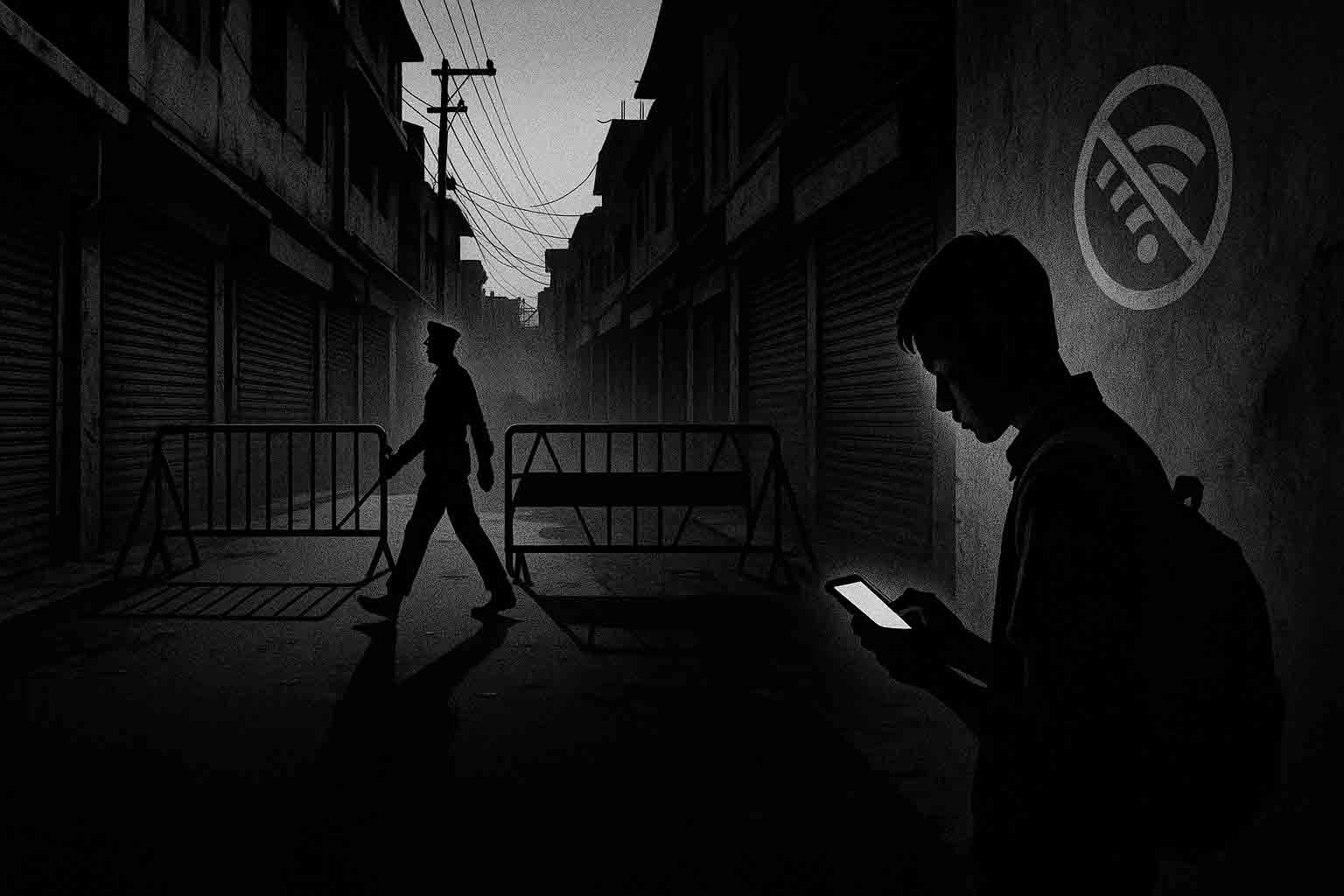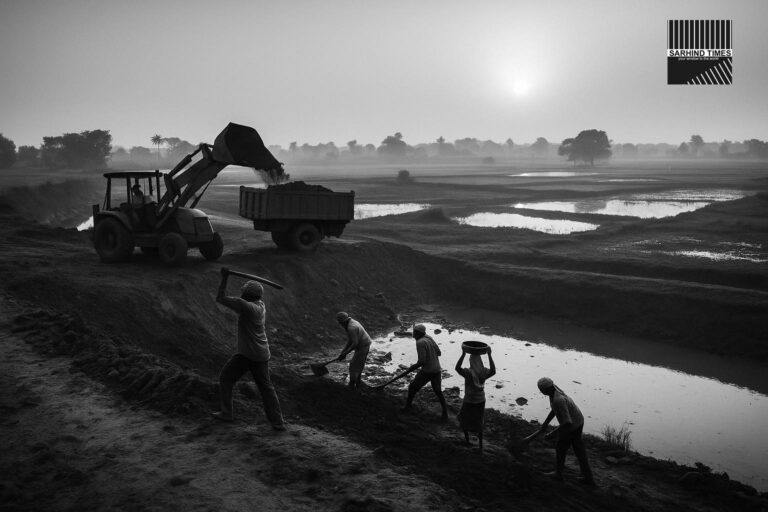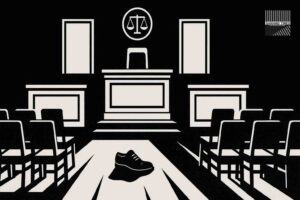Cuttack, Odisha | October 7, 2025 — The Odisha government on Monday extended the suspension of mobile internet across parts of Cuttack till 7 pm today (October 7), as police and civil administration struggled to restore calm after clashes linked to Durga idol immersion processions. Multiple injuries were reported; curfew and prohibitory orders remain in place across several police-station limits while senior officers led flag-marches in sensitive pockets.
The Lead: What’s Happening, Where, and Till When
According to official notices and media briefings, the temporary suspension of internet services—initially enforced from 7 pm Sunday to 7 pm Monday—was extended for another 24 hours in parts of the city, citing the risk of provocative messages, rumor-mongering, and mobilization through social media platforms. Authorities stated the curbs are calibrated and time-bound, aimed at averting fresh flare-ups while heavy deployment remains on the streets.
The clampdown follows at least two episodes of violence around immersion routes and adjoining neighborhoods over the weekend and into Monday, with reports indicating over two dozen injuries, fresh stone-pelting, and sporadic confrontations with the police. The administration has imposed curfew/prohibitory orders in multiple police-station areas and appealed for calm.
The Spark and the Spread
Officials and local reports said tensions escalated around an immersion procession route in the Dargha Bazaar area, with altercations rippling into nearby streets. As police tried to keep processions moving and prevent spillover, tempers flared again a day later when protest calls, rumors and counter-mobilisations swirled online, prompting a widened shutdown of data services and tighter curbs on movement.
Police have denied rumors of fatalities, but acknowledged injuries to civilians and policemen. Senior officers said arrests have begun, and more suspects will be identified from CCTV and mobile video footage once data access resumes and technical teams complete extractions.
What the Shutdown Covers—and What It Doesn’t
As per the latest extension, mobile internet is suspended across areas under Cuttack Municipal Corporation, parts of the Cuttack Development Authority (CDA), and adjoining Mauza zones notified by the Home Department. Fixed-line broadband and enterprise links in some locations may continue under strict watch; officials emphasised the objective is to block rapid, anonymous spread of incendiary content typical on mobile-only platforms and closed messaging groups. Essential services are exempt from movement curbs.
Residents told local reporters the shutdown hampered UPI payments, ride-hailing, and routine work-from-home tasks. Colleges flagged exam schedules this week and requested temporary Wi-Fi zones at campuses and hostels; the district administration said it would consider controlled access points for students if the curbs stretch further.
The Law and the Courts: Proportionality and Transparency
The extension revives a long-running national debate shaped by the Supreme Court’s Anuradha Bhasin judgment (January 2020), which held that indefinite internet suspensions are illegal, and every shutdown order must meet tests of necessity and proportionality, with reasoned orders published for public scrutiny. Rights groups routinely benchmark fresh shutdowns against those tests and file RTIs or challenges if disclosures are incomplete.
Odisha’s Home Department, while invoking public order concerns, will likely need to show that (a) less restrictive measures were inadequate, (b) the scope of the shutdown is limited to the affected geography, and (c) duration is the minimum necessary. Legal observers say 24–48-hour windows in targeted urban pockets can pass the proportionality test where there is concrete intelligence of fresh mobilisations, but rolling extensions without clear, published reasons invite judicial scrutiny.
Economics of a Switch-Off: Small Businesses, Logistics, and Daily Life
Cuttack’s dense network of small traders, food delivery runners, medicine suppliers, and service professionals is acutely dependent on mobile data for discovery, payments, and dispatch. A day-long shutdown can freeze QR-code payments, trigger cash shortages, and push customers towards IOUs—especially in local markets where point-of-sale machines and broadband aren’t universal. A 2023 Human Rights Watch report chronicled how shutdowns across Indian states disrupted daily wages, telemedicine, and education, compounding vulnerability for low-income households.
Logistics operators said GPS-based route tracking and real-time delivery updates are degraded when drivers and helpers are on mobile data alone. For hospitals, back-office systems may still run, but family updates, ambulance coordination and digital payments at admission desks often rely on mobile apps.
Police Posture: Containment, Communication, and Credibility
City police said they have flooded streets with personnel, set up check posts, and are conducting flag-marches to reassure residents. Senior officers are meeting RWA representatives, procession organisers, and community elders to block rumor cycles. In parallel, cyber teams are cataloguing instances of provocative posts for FIRs—once connectivity resumes or when devices are seized for forensic imaging.
As visibility of police surges, so do questions around communication strategy. Public order experts say that during shutdowns, offline communication—public address systems, mohalla meetings, and ward-level grievance counters—must increase. The administration has also urged local media to verify claims before airing them and to supply helpline numbers for curfew/permit queries.
Politics Stays Cautious—for Now
The state government and opposition leaders have urged restraint. Given the communal undertones reported by some outlets, most political statements have been tempered, focusing on peace appeals and calling for firm action against alleged instigators. If shutdowns extend or arrests spike controversially, this could enter the assembly and parliamentary rhetorical arena quickly.
Education, Exams and the “Student Clause”
Several undergraduate colleges reported internal assessments and practicals this week. Administrators requested that the district consider on-campus Wi-Fi islands with device registration and usage logs, or a time-boxed relaxation for educational platforms. While shutdown orders typically offer exemptions for government services, there is no uniform protocol for student access. Courts have previously nudged administrations to balance order and rights, especially when blanket shutdowns impede access to education in exam windows.
Curfew Mechanics: Where Movement Is Tightest
The police have not publicly released a detailed map, but reports indicate curfew/prohibitory measures in multiple PS limits with permit-based movement for essentials. Emergency medical travel is allowed; pharmacies, some groceries, and milk booths are open at curtailed hours. The Cuttack bandh call by some groups compounded early-week disruptions before being overtaken by the formal curfew.
Arrests and Investigations
At least 8 arrests were reported till Monday evening, with more detentions expected as the probe widens. Police said they would cross-verify video clips with tower dumps and CCTV grids once networks stabilize. Legal teams anticipate a mix of bailable and non-bailable sections—unlawful assembly, rioting, damage to public property, and promoting enmity, depending on the evidence trail.
How Long Can This Last?
The administration has fixed the latest internet curb till 7 pm today and said the situation will be reviewed based on ground intelligence and peace committee feedback. If the evening passes without incident, a phased rollback—first in stable wards—is possible. Conversely, a disruptive rumor cycle at dusk could prompt another short extension.
The Bigger Picture: Shutdowns as a Governance Tool
India has, for years, topped global tallies of internet shutdowns. While police often describe the measure as preventive, rights groups note that transparency remains uneven: not all orders are publicly posted; granular reasons are rare; and measurable thresholds for rollback are unclear. The Anuradha Bhasin line of cases tries to correct this by insisting on publication of orders and strict proportionality—a template Odisha will be judged against in Cuttack.
What Residents Can Do (Practical Guide)
- Stick to verified updates: Use TV/radio/local administration bulletins; avoid forwarding unverified videos.
- Payments: Keep cash for essential purchases; ask shops if they have broadband POS.
- Medical: Keep helpline numbers handy; inform local beat officers for emergency transits during curfew.
- Students: Check with colleges for noticeboard updates; if Wi-Fi hotspots are announced, carry ID and follow usage rules.
- Documentation: Save receipts/photos of property damage; file e-FIR once networks are up if needed.
Voices from the Ground
- “We’ll decide on lifting or extending the curbs after a field assessment later today,” a senior official said, indicating hour-by-hour review.
- “Our goal is to prevent misinformation spikes at sensitive hours. Forces remain on streets to reassure residents,” a police officer on night deployment told reporters.
- “One more day without mobile data means stalled orders and cash crunch. Customers think we refused UPI on purpose,” said a snack-stall owner near College Square. (Inference combining shutdown impact literature and local market dependency.)
What to Watch This Evening
- 7 pm decision window: Does the Home Department end or narrow the shutdown?
- Curfew relaxations: Any hour-long windows for essentials or student movement?
- Arrests and recovery: More detentions, recoveries of weapons, or proof of planned mobilisations.
- Transparency: Are shutdown orders publicly posted with reasons and specific geographies?
Conclusion
Cuttack’s internet ban, in force till 7 pm today, underscores the governance tightrope between public order and digital rights. With curfew and heavy policing stabilizing the streets, attention now shifts to how authorities unwind the restrictions, how quickly they restore normalcy, and how transparently they justify every step. For residents juggling exams, livelihoods, and essential errands, each hour of connectivity—or its absence—has direct consequences.
If Odisha’s rollout and rollback are measured, reasoned, and published, it may serve as a workable urban playbook for tense festival-season flashpoints. If not, Cuttack could become another data point in India’s long list of avoidable digital blackouts.
#Cuttack #Odisha #InternetShutdown #Curfew #DurgaPuja #LawAndOrder #DigitalRights






+ There are no comments
Add yours